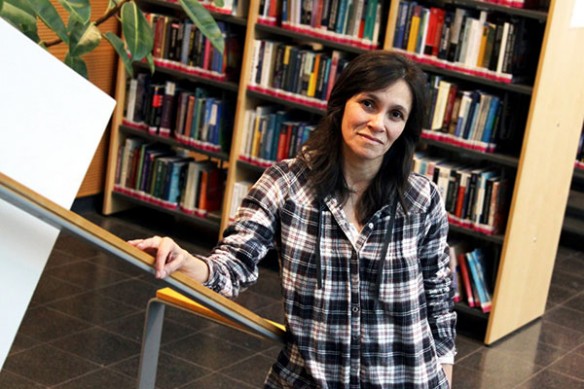Virginia Brilhante had already many years of academic experience under her belt when she started studies at the Faculty of Science’s MBI Master’s Degree Programme in Bioinformatics. The interdisciplinary programme combining informatics and life sciences gives her the opportunity to make a difference and improve people’s lives.
Virginia Brilhante from Brazil studies in the MBI Programme in Bioinformatics at the Faculty of Science. She is working towards Master’s degree and it’s not her first one.
Virginia completed her under-graduate studies in Computer Science in her home country, and did both Master’s and Doctoral Degree in Artificial Intelligence at the University of Edinburg in Scotland.
“I know it is a bit unconventional to study Master’s after PhD,” Virginia says laughing and admits that people often get a bit surprised after hearing about her background but she has a good explanation for her decision.
After moving in Finland because of her husband’s work at Nokia at the time, Virginia took some time to think about her career and options. “At the time I felt I needed renewal and wanted to find a field in which I could make a difference and get both intellectual and personal fulfillment.”
The decision to apply to the Faculty of Science was based on the information she found online. “And I have been fortunate to find this study place,” she adds.
Bioinformatics means applying informatics into life sciences. The programme is interdisciplinary and students come from various backgrounds according to which they can tailor the degree to complement their previous studies. Virginia, having a strong background in Computer Science, has focused her studies on biology and medicine. “The thought processes I learned while doing my PhD are still with me and now I can apply them to these fields,” she says.
Virginia landed a summer internship at Biomedicum, Faculty of Medicine, in 2011 and has since continued working there in a research group that studies mitochondrial biology and diseases. “We do sequencing of patient DNA and through methods and tools of bioinformatics try and find the mutations that cause the patient’s disease.”
“One of the things I like about working there is that it’s not just basic research but the ultimate goal of the group is to develop treatments and therapies for mitochondrial diseases that don’t have a cure at the moment. This way I’m reaching my goal of making a difference,” she says.
The interdisciplinary degree program has provided Virginia with a great possibility to get to know all four campuses of University of Helsinki: biology at Viikki, mitochondrial research at Meilahti, Finnish lessons at City Centre Campus, and of course Computer Science at Kumpula.
“The infrastructure of Kumpula Campus is great, and we have everything we need here to study. The labs, the library, everything is very approachable. In Finland, the hierarchy is low and I can really see it here. You feel that you can approach the Faculty staff and discuss your studies.”
After graduating, Virginia plans on continuing her research work at Biomedicum. She has made Finland a home for herself and her international family with Greek husband and two daughters, the youngest born in Finland.
“I’m glad to be here and I have no intention of leaving. If Finland will have me, it’ll have us. This country gives me the sense of stability; it’s a place where you can easily balance your work and family life. Here we also have the sense of security, and the society works for the better most of the time,” Virginia says.
Text: Elisa Lautala
Photo: Sakari Tolppanen

